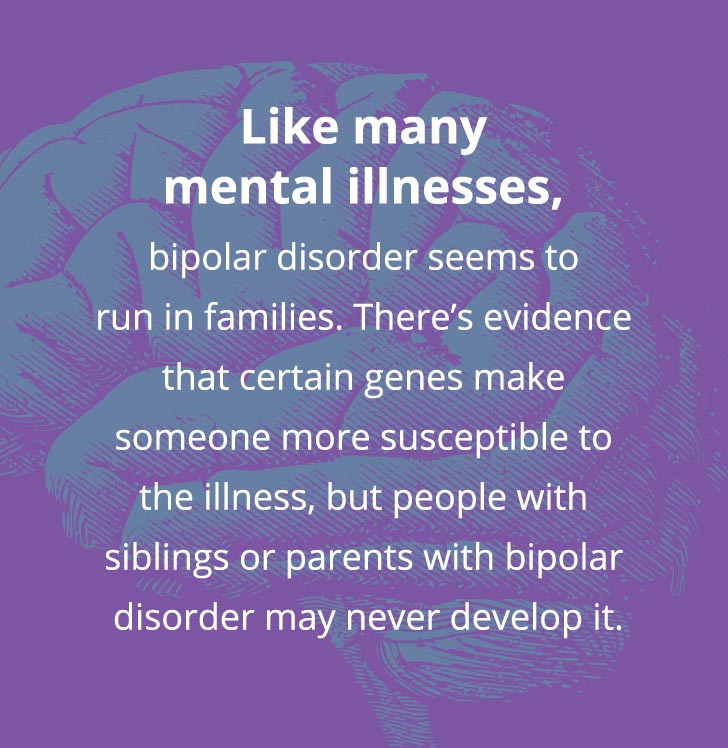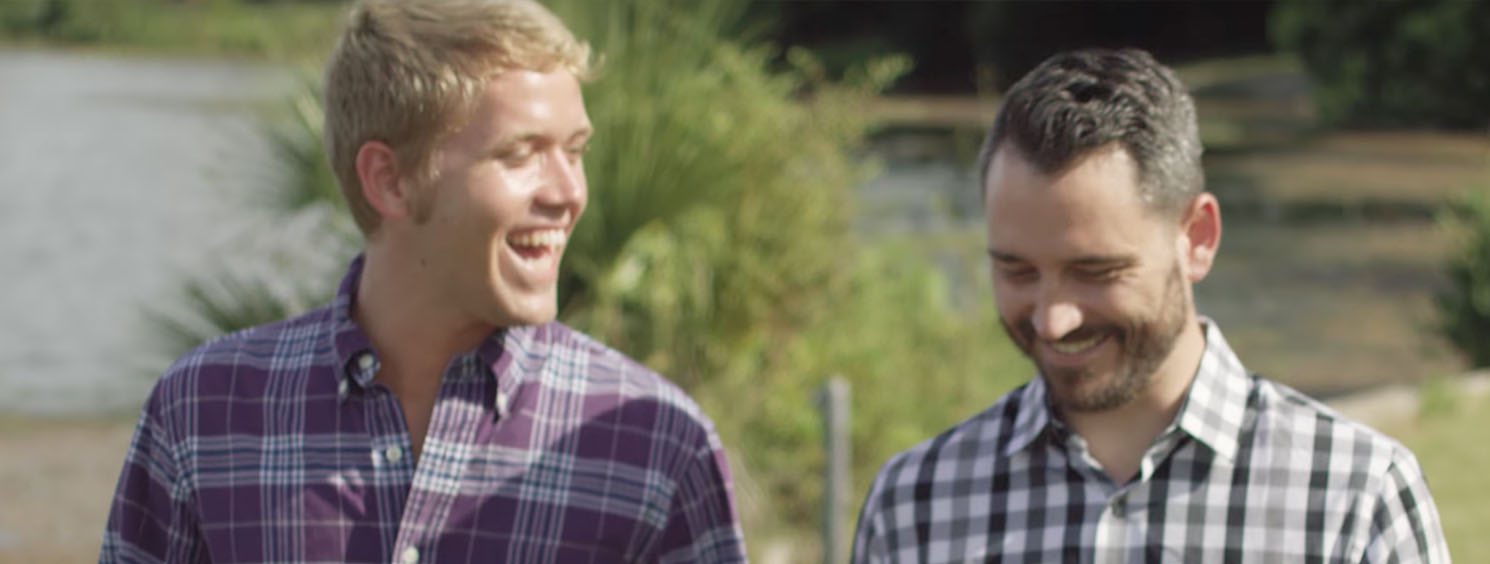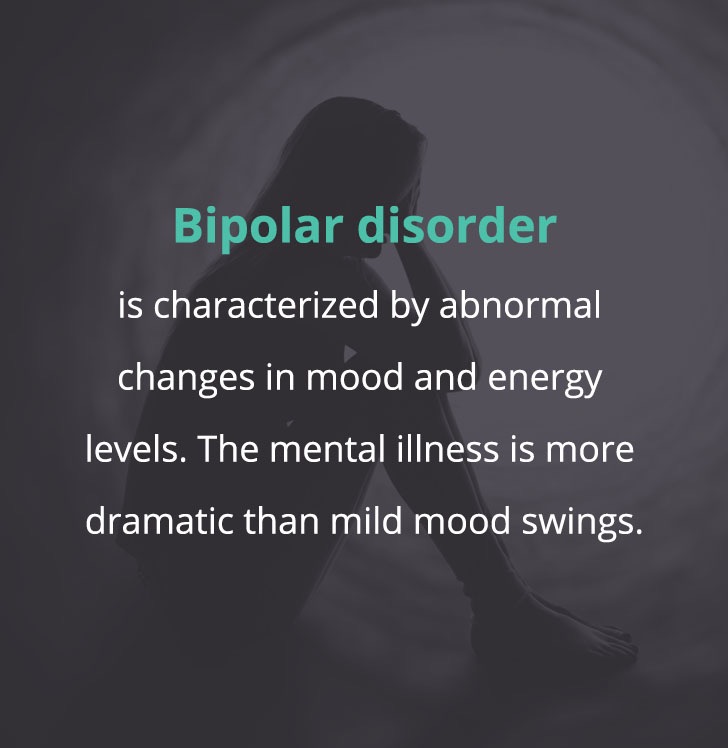Bipolar disorder is characterized by abnormal changes in mood and energy levels. The mental illness is more dramatic than mild mood swings. People with bipolar disorder suffer severe changes in mood, suffering from depression, mania or a combination of both.
Without treatment, people with bipolar disorder struggle to maintain interpersonal relationships and regular employment. They may consider suicide. Sometimes it can be difficult to recognize symptoms of bipolar disorder. Between episodes of depression or mania, people with the disorder may be free of symptoms. Others experience less severe symptoms between episodes.
Bipolar disorder usually occurs near the end of
adolescence and the early part of adulthood, with about 50 percent of diagnoses occurring before age 25. Bipolar
disorder is a lifelong disease for most people, but medical treatment can ease symptoms and help patients maintain more
stable moods.
Treatment is more difficult when a person is involved with substance abuse. People with bipolar disorder misuse substances
such as drugs and alcohol at rates much higher than those of the general population. Some experts estimate that people
with the disorder are up to seven times more likely to have a
substance use disorder.
Health care professionals aren’t sure why people with bipolar disorder misuse drugs and alcohol at a high rate. Some people
attempt to
treat symptoms of their illness with the substances, but substance abuse can activate or prolong symptoms. Symptoms of bipolar disorder, such as difficulty controlling behavior, may contribute to someone abusing drugs or alcohol.
People with bipolar disorder also tend to suffer from other co-occurring illnesses, including attention-deficit hyperactivity disorder (ADHD) or anxiety disorders, such as social phobia or post-traumatic stress disorder (PTSD). Symptoms of the disorders may overlap, making diagnosis difficult.
It can be extremely difficult for people with bipolar disorder to live daily life without treatment. Substance abuse may provide a temporary fix for some, but it can cause prolonged or heightened symptoms and lead to addiction. Fortunately, some rehabilitation clinics specialize in treating patients with bipolar disorder and other co-occurring illnesses.
Struggling with Bipolar Disorder and Addiction?
Our recovery programs are designed to meet your individual needs.
Get Help Now
Symptoms of Bipolar Disorder
People with bipolar disorder feel seemingly opposite symptoms depending on the type of episode they’re experiencing. Manic
episodes are usually characterized by an unusual high feeling, and depressive episodes are characterized by intense feelings
of sadness. Some people experience mixed episodes in which they experience both high and low feelings.
- Feeling unusually happy or outgoing
- Impulsive, high-risk behavior
- Irritability
- Restlessness
- Alertness
- Racing thoughts
- Distractibility
- Feeling sad or hopeless
- Feeling tired
- Problems concentrating
- Losing interest in enjoyable activities
- Changing eating and sleeping routines
- Contemplating suicide or death
People in a mixed state feel a combination of symptoms. They may feel energized and sad or feel agitated while having suicidal
thoughts.
Others with severe bipolar disorder may have hallucinations or other psychotic symptoms. During a manic episode, they may
think they’re famous or have supernatural abilities. During a depressive episode, they may believe their family has left
them or think they did something they did not do.
Types of Bipolar Disorder
Health professionals characterize bipolar disorder by severity and duration of symptoms.
- Bipolar I disorder:
- People with bipolar I tend to experience manic or mixed episodes lasting at least seven days and depression lasting at least two weeks. Manic episodes may be so intense that the person requires immediate medical attention.
- Bipolar II disorder:
- People with bipolar II suffer depression and less severe manic or mixed episodes than people with bipolar I.
- Bipolar disorder not otherwise specified:
- Doctors diagnose people with BP-NOS when a person’s symptoms are unmistakably abnormal but they do not meet criteria for bipolar I or bipolar II.
- Cyclothymic disorder:
- Also called cyclothymia, cyclothymic disorder is characterized by mild episodes of mania and depression occurring for at least two years. Doctors diagnose it when symptoms do not meet criteria for bipolar I or II.
- Rapid-cycling bipolar disorder:
- People with rapid-cycling bipolar disorder suffer four or more episodes of depression, mania or mixed episodes in one year.
The reasons some people suffer bipolar I and others suffer bipolar II isn’t clear. Health professionals are still trying
to understand the causes of all types of bipolar disorder.
Causes of Bipolar Disorder
Most experts believe bipolar disorder can be caused by multiple factors that act together to increase the risk of the illness.

Like many mental illnesses, bipolar disorder seems to run in families. There’s evidence that certain genes make someone more
susceptible to the illness, but people with siblings or parents with bipolar disorder may never develop it.
Researchers studied twins with the same genes and found that one twin may develop bipolar disorder while the other one doesn’t.
The results lead experts to believe environmental factors may play a large role in a person’s likelihood of experiencing
the illness.
Studies of the brain indicate that the parts of the brain that handle problem solving and decision making are different in
people with bipolar disorder. Their brain development is also similar to that of people with multi-dimensional impairment,
a disorder with symptoms similar to
schizophrenia and bipolar disorder.
Treating Substance Abuse Disorders and Bipolar Disorder
Treating someone with bipolar disorder and a substance use disorder can be difficult when health professionals are unaware
of the
co-occurring disorders or are inadequately equipped to treat them.
Nanci Stockwell of Advanced Recovery Systems discusses how mental health professionals treat co-occurring disorders. She
explains why it’s important for someone with bipolar disorder and a co-occurring substance use disorder to receive integrated
treatment.
Substance abuse makes symptoms of bipolar disorder worse and decreases the benefits of standard treatment. People tend to
take longer to recover, spend more time in health facilities and be more likely to
contemplate suicide when they misuse substances during treatment. Individuals with co-occurring disorders can find
the best care at rehabilitation facilities specifically equipped for treating both illnesses.
Looking for Help?
Our dual recovery programs are based on decades of research to deliver treatment that really works.
Get Help Now
Treatment for substance abuse typically begins with a
detoxification process, which may include medication depending on the substance of abuse and severity of withdrawal
symptoms. Health professionals do their best to treat withdrawal symptoms to keep patients as comfortable as possible.
Doctors can not cure bipolar disorder, but treatment can reduce the severity and frequency of symptoms. Long-term treatment
is required to control symptoms throughout life.
Treatment for bipolar disorder normally begins with medication, but medication may not be appropriate for everyone. Patients
should discuss the benefits and risks with their doctors before taking a medication.
- Lithium:
- Available in brand names Eskalith and Lithobid, lithium effectively stabilizes moods during both manic and depressive episodes.
- Anticonvulsants:
- Anti-seizure drugs like Depakote (valproic acid) and Lamictal (lamotrigine) can manage symptoms of bipolar disorder.
- Atypical antipsychotics:
- When taken in combination with other drugs, atypical antipsychotics, such as Risperdal (risperidone) and Seroquel (quetiapine), can treat bipolar disorder.
- Antidepressants:
- Antidepressants may treat depressive episodes, but they are often taken in combination with other drugs to prevent a manic episode from developing.
Treatment with medications works best when used alongside
behavioral therapy. Therapy is also used to treat most substance use disorders, so individualized treatment plans
can help patients recover from co-occurring disorders simultaneously.
- Cognitive behavioral therapy:
- Assists patients with removing harmful behaviors or choices from their lives and decreases negative thoughts.
- Family-focused therapy:
- Includes members of the family to build coping and recognition strategies. It encourages families work together to provide support.
- Interpersonal and social rhythm therapy:
- Helps patients manage daily life and improve interpersonal relationships.
- Psychoeducation:
- Teaches patients about their condition and treatment options. The therapy teaches patients to recognize upcoming changes in behavior and manage them before symptoms become worse.
Getting Help
When health professionals develop co-occurring disorder treatment plans specific to an individual, patients see improvements
in the way they enjoy life. Patients do
recover from substance use disorders, but treatment takes time and hard work. Bipolar disorder cannot be cured, but
patients can learn to minimize and manage their symptoms.

Without
treatment, symptoms of bipolar disorder can deteriorate. The severity, length and frequency of manic and depressive
episodes can worsen. Delays in diagnosis and receiving treatment can negatively affect regular life and relationships.
Facilities that specialize in treating bipolar disorder with co-occurring disorders can rehabilitate patients so they can
enjoy life.
Medical Disclaimer: DrugRehab.com aims to improve the quality of life for people struggling with a substance use or mental health disorder with fact-based content about the nature of behavioral health conditions, treatment options and their related outcomes. We publish material that is researched, cited, edited and reviewed by licensed medical professionals. The information we provide is not intended to be a substitute for professional medical advice, diagnosis or treatment. It should not be used in place of the advice of your physician or other qualified healthcare provider.
 Addiction
Addiction
 Treatment
Treatment
 Faith & Religion
Faith & Religion
 Active Recovery
Active Recovery
 Our Community
Our Community






